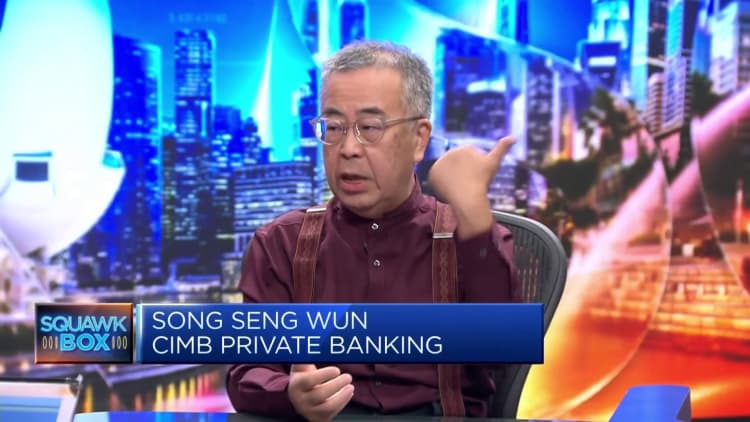A staff member counts Singapore dollar currency notes at Raffles Place financial business district in Singapore on October 6, 2022. (Photo by Roslan RAHMAN / AFP) (Photo by ROSLAN RAHMAN/AFP via Getty Images)
Roslan Rahman | Afp | Getty Images
Singapore’s central bank said that the country’s gross domestic product is expected to “moderate significantly” this year, and that prospects for growth this year have “dimmed.”
This comes as the economy grew 0.1% in the first quarter compared with a year ago, according to the trade and industry ministry’s advance GDP estimates. However, compared with the previous quarter, GDP contracted by 0.7%, the first contraction since the second quarter of 2022.
MAS said global economic activity was “somewhat more resilient than expected” in the first quarter of 2023, with the fall in global energy prices, strong consumption demand in the advanced economies, and the lifting of pandemic restrictions in China.
However, it expects that tighter financial conditions globally will lead to an intensified drag on global investment and manufacturing. MAS also sees the reopening demand boost in most regional economies tapering off over the course of the year.
Limited boost from China’s reopening
While China’s reopening is relatively recent, the Singapore central bank expects the mainland’s rebound will be largely consumption driven and oriented toward its domestic services market.
The MAS said “growth in Singapore’s major trading partners will be slower in 2023, below the pace recorded in the previous two years.”
Singapore’s trade-related cluster is expected to contract further, and growth domestically is forecasted to moderate as higher consumer prices and interest rates restrain spending. The MAS expects 2023 GDP growth of between 0.5% and 2.5%, down from the 3.6% growth in 2022.

Singapore’s manufacturing sector makes up the largest portion of its GDP, standing at 21.6% of nominal GDP in 2022. The sector contracted by 6% in the first quarter from a year ago, according to the trade and industry ministry’s release, steeper than the 2.6% year-on-year contraction recorded in the previous quarter.
On a quarter-on-quarter basis, the sector shrank by 5.2% in the first quarter, a reversal from the 1% expansion in the fourth quarter of 2022. The ministry noted there was an output contraction across all manufacturing clusters, except for transport engineering.
MAS halts tightening cycle
On Friday, MAS also announced it will maintain its monetary policy, bringing a halt to its five-straight tightening decision streak since October 2021.
The central bank explained that while inflation is still elevated, its tightening moves have “tempered the momentum of price increases.”
“The effects of MAS’ monetary policy tightening are still working through the economy and should dampen inflation further,” it added.
As such, it will maintain the prevailing rate of appreciation of the exchange rate policy band, known as the Singapore dollar nominal effective exchange rate, and there will be no change to its width or the level at which it is centered.
Singapore manages monetary policy through exchange rate settings and not interest rates. On Friday, the Singapore dollar traded at 1.3255 against the U.S. dollar.
The MAS expects inflation to stay elevated over the next few months, due to accumulated business costs feeding through to consumer prices.
Headline inflation for Singapore stood at 6.3% in February, while MAS core inflation — which excludes accommodation and private transport costs — has held at a 14-year high of 5.5%.
However, inflation is expected to “slow more discernibly” in the second half of this year and end the year significantly lower. The MAS projected core inflation to reach about 2.5% by the end of 2023.
For the full year, MAS core inflation is expected to average 3.5% to 4.5%, with headline inflation estimated to be between 5.5% and 6.5%.


